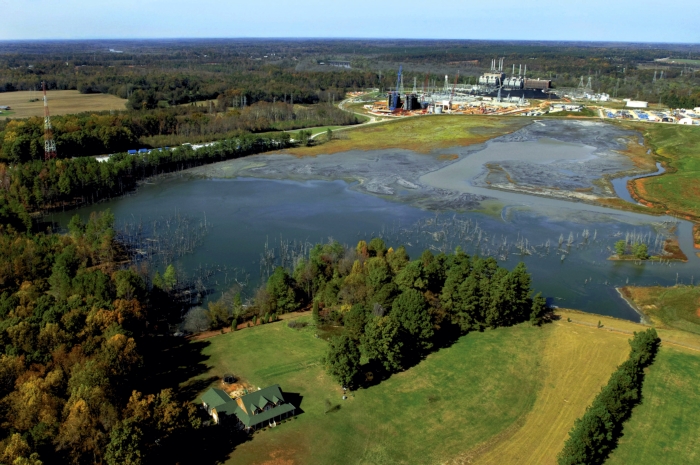Internal document: Buck Steam Station a high-priority site
Published 12:05 am Friday, December 18, 2015

- JON C. LAKEY / SALISBURY POST An November 2010 aerial photograph of the first holding basin that was being used to hold the by products from the coal fired Buck Steam plant seen in the background. Currently the plant is offline and no longer discharging into the basin.
State government would force Duke Energy to excavate coal ash at Buck Steam Station under internal recommendations released Thursday.
All coal ash ponds at Buck Steam Station received a high priority ranking, according to a document released by the Southern Environmental Law Center. In fact, most coal ash ponds across North Carolina received a high priority ranking. It’s not clear whether the draft recommendations by the Department of Environmental Quality would mirror final rankings due by Dec. 31. If Rowan’s high priority ranking sticks, Duke Energy would be required to excavate all coal ash ponds at Buck Steam Station in the Dukeville community by 2019, according to the Coal Ash Management Act.
Southern Environmental Law Center Attorney Frank Holleman said excavation is an option preferred by his organization, which is involved in multiple lawsuits over coal ash contamination in North Carolina. The SELC received the draft recommendations as part of the discovery phase in a state lawsuit.
“Of course, the first concern is that the political leadership (of DEQ) follows the recommendations of their staff who are familiar with the site and have actually studied the scientific documents of the area,” Holleman said.
Holleman and SELC attorney Myra Blake said they were pleasantly surprised by the state’s draft recommendations. Holleman called excavation the cleanest and safest solution available. The process has occurred in North and South Carolina without public complaints, he said.
“We felt all along it was a matter of common sense the ash needs to be safely stored,” he said.
Duke Energy declined to comment about the draft recommendations. Duke spokeswoman Erin Culbert said the company hadn’t seen the recommendations prior to Thursday and said it’s not appropriate for the company to respond to a draft internal document.
In an emailed statement, the Department of Environmental Quality characterized the release of the draft document as only representing “a snapshot of the complicated scientific analysis.”
“It would be irresponsible and premature to make final assumptions before Duke has provided DEQ with all of the data it needs,” said DEQ spokeswoman Stephanie Hawco. “The SELC is attempting to corrupt the process by releasing an early draft out of context and ignoring the most recent data. It also does a disservice to the DEQ employees who are working hard to finalize the prioritization list, which will be released by Dec. 31 in keeping with the coal ash management law.”
Technically, North Carolina’s defunct Coal Ash Commission, not the Department of Environmental Quality, is tasked with finalizing coal ash priority rankings, but DEQ’s recommendations automatically become law after 60 days, according to the 2014 Coal Ash Management Act.
A superior court ruling in March found six of the nine members of the commission were appointed unconstitutionally. As a result, the commission doesn’t have a quorum and likely can’t hold a meeting, said Chairman Michael Jacobs in a November letter to Gov. Pat McCrory and other top state leaders.
“Without a full commission, or at least a quorum, we cannot convene a meeting to perform the responsibilities with which we have been charged,” Jacobs wrote.
In a response to the letter on behalf of McCrory, DEQ Secretary Donald van der Vaart cited the automatic adoption clause as proof that cleanup wouldn’t be delayed because of the defunct Coal Ash Management Commission.
The case now sits in the North Carolina Supreme Court, which hasn’t yet issued a ruling.
With a fully operation Coal Ash Management Commission, DEQ would notify plant neighbors — an overwhelming majority of which were told by state government not to drink their well water — about its recommendations and have a public comment period, including individual hearings. The coal ash commission would give final approval.
Although unrelated to the priority rankings, Buck Steam Station received approval on Thursday to drain water from the top level of its coal ash ponds. Called decanting, the procedure needed approval from the Environmental Protection Agency. De-watering is another process that would drain all water from coal ash ponds.
Contact reporter Josh Bergeron at 704-797-4246




